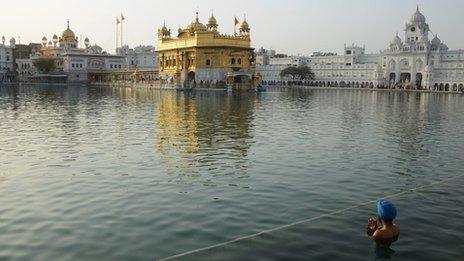Golden Temple attack: UK advised India but impact 'limited'
- Published
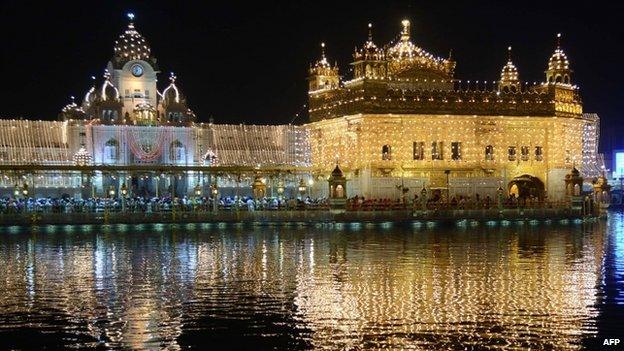
The Golden Temple is one of the holiest shrines for Sikhs
British military advice was given to India ahead of the 1984 deadly attack on a Sikh temple but it had only "limited impact", MPs have been told.
Foreign Secretary William Hague was delivering the findings of a review, external into claims an SAS officer helped Delhi plan the raid which killed hundreds.
The storming of the Golden Temple in the city of Amritsar was intended to flush out Sikh separatists.
Mr Hague said UK assistance was "purely advisory" and given months beforehand.
The inquiry was launched last month after declassified documents were said to suggest Margaret Thatcher's government was involved in planning the raid, called Operation Blue Star.
Official figures put the death toll at 575, but Mr Hague said other reports suggested "as many as 3,000 people were killed including pilgrims caught in the crossfire".
William Hague said a review had concluded British advice had "limited impact" on the Amritsar operation
"This loss of life was an utter tragedy," he said.
"Understandably members of the Sikh community around the world still feel the pain and suffering caused by these events."
Delivering his statement, Mr Hague set out the UK's involvement in planning for the raid.
He told the Commons that the British government had received an urgent request for help from Indian authorities who wanted to regain control of the temple from Sikh militants.
In response, an unnamed British military adviser was sent to India in February 1984, and he recommended any attack should be a last resort, MPs heard.
The adviser suggested using an element of surprise, as well as helicopters, to try to keep casualty numbers low - features which were not part of the final operation, Mr Hague said.
No equipment or training were offered, Mr Hague said, and the Indian plan "changed significantly" in the following three months, to cope with a considerably larger dissident force and extensive fortifications within the temple complex.
The investigation, carried out by Cabinet Secretary Sir Jeremy Heywood, involved searching 200 files and 23,000 documents.
Prime Minister David Cameron said: "I hope the manner in which we have investigated these dreadful events will provide some reassurance to the Sikh community, here in Britain and elsewhere."
He added: "A single UK military officer provided some advice. But critically, this advice was not followed, and it was a one-off."
Retired Lt Gen Kuldeep Singh Brar, who led Operation Blue Star, maintains he had no advice or support from Britain.
"If some things went around months earlier or weeks earlier with other agencies, intelligence agencies, I am not aware of them," he told the BBC.
"From the time I was given command of Operation Blue Star until I planned it and executed it, let me emphatically tell you that there was no involvement whatsoever as far as the British are concerned."
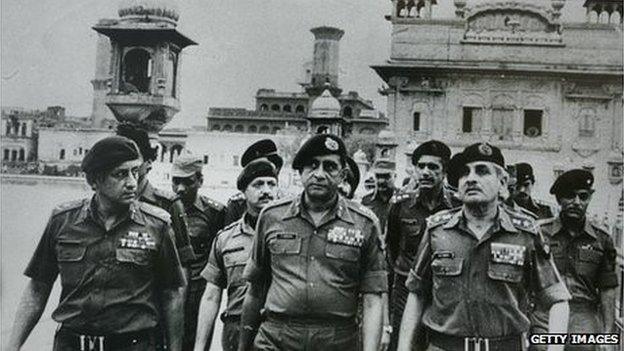
Indian army soldiers moved to flush out Sikh separatists from the Golden Temple in June 1984
Paul Uppal, the UK's only Sikh MP, said many Sikhs would be "relieved that it was just purely advice that was given".
He praised the speed and thoroughness of the review and said it could be an "important step" towards "some closure" for Sikhs.
But Lord Indarjit Singh, director of the Network of Sikh Organisations, called Mr Hague's statement "smug and condescending".
On the claim that UK advice had a "limited impact" of the Golden Temple attack, Lord Singh said: "It is like saying that I had only a minimal involvement in a massacre or a holocaust."
He said the language in the documents was "insulting" to Sikhs - suggesting they were all extremists - and the UK's real motivation in assisting India was keeping its arms contracts.
But Mr Hague said the review had found "no evidence" UK military advice in February 1984 had been "linked to defence sales or any other policy issue".
Lord Singh, Network of Sikh Organisations: "Why should Britain be involved in the attack on a religious minority"
Jasvir Singh, director of the City Sikhs Network, which represents Sikh professionals in the UK, said the information disclosed in the review "harks back" to colonial times.
"I think there are lots of people in the Sikh community who are upset that the British could be involved in this, even to a limited extent," he said.
Mr Singh said many details about British involvement in the 1984 attack were still unclear, and called for "transparency" from the authorities.
UK Sikh groups have said the government review should have looked not only at June 1984 but also the events that followed, and Mr Singh also criticised this "narrow scope".
The Indian government said the UK had kept it "informed on this matter".
"We have noted the report and the statement made," an Indian foreign ministry spokesman said.
Indira Gandhi assassinated
David Cameron ordered the review last month after Labour MP Tom Watson said he had seen papers from Margaret Thatcher "authorising Special Air Services (SAS) to work with the Indian government".
Mr Watson cited two letters released under the 30-year rule. He said a 1984 letter from the prime minister's office stated that a British adviser had "visited India and drawn up a plan" which had been approved by the Indian government.
Shadow foreign secretary Douglas Alexander said "serious questions" remained about British involvement, and called for all relevant documents to be released.
The Sikh separatists at the Golden Temple in 1984 had been demanding an independent homeland - called Khalistan - in Punjab.
In October 1984 Indian Prime Minister Indira Gandhi was assassinated by her Sikh bodyguards in what was thought to be a revenge attack for what happened at the Golden Temple.
A month later, more than 3,000 people were killed in anti-Sikh riots across India.
- Published15 January 2014
- Published15 January 2014
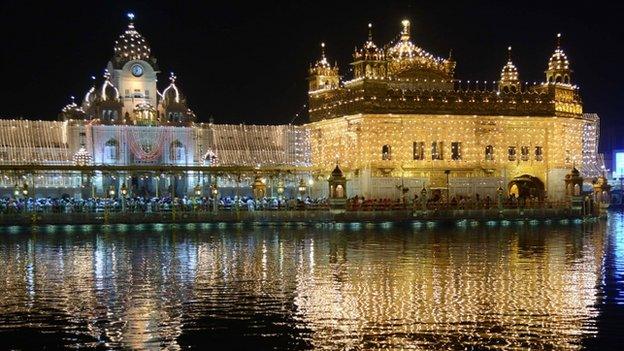
- Published14 January 2014
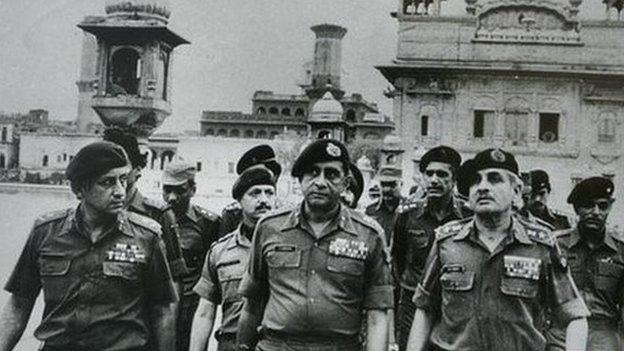
- Published31 July 2013
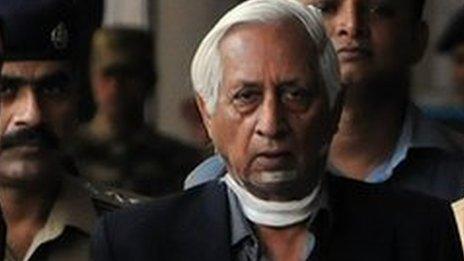
- Published1 August 2013
